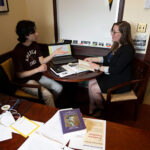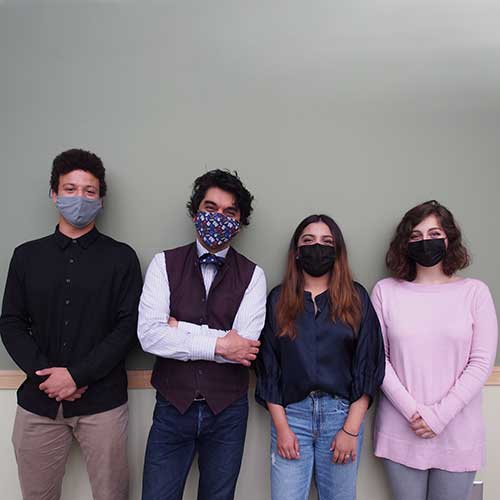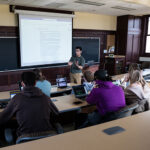
Social Entrepreneurship team supports local economy with food incubator research

After a year when many businesses sought to capitalize on a booming e-commerce market, students and faculty from The College of Wooster’s Social Entrepreneurship (SE) program collaborated on a research project to fuel the local economy.
The SE program, co-founded by Amyaz Moledina, chair of the economics department and associate professor of economics/global and international studies, uses experiential learning in partnership with social change organizations to solve business problems. For the 2021 seminar, Moledina advised Wooster students Keegan King ’22, Claira Schiffrik ’23 and Eraj Sikandar ’22 on a research project called Catalyzing Food Entrepreneurship (CaFE). The project, requested by FoodSphere: The Entrepreneurial Center at Local Roots, was part of a $70,000 grant from The Ohio State University’s Initiative for Food and AgriCultural Transformation. Some of the research that was conducted was the College’s contribution as an in-kind donation to this larger endeavor.
FoodSphere is a kitchen/business incubator in downtown Wooster. It called on the student team to research the structure and operation of U.S. food incubators in order to understand how such organizations successfully organize and fund themselves.
“Incubators are where new businesses and ideas are born,” said Moledina. “For example, if someone has an idea for hot sauce, they need a commercial kitchen and people in the food industry to get them up to speed on regulations, working capital, testing, etc. to launch their product.”
In Wayne County, FoodSphere aims to cultivate economic growth and sustainability through the support of local farmers and entrepreneurs of value-added agricultural products.
After conducting interviews on Zoom throughout the spring semester, King, Schiffrik, and Sikandar discovered that “Many incubators provide a diverse range of services and training programs [to participants], such as using the kitchen space for co-manufacturing, that make the business-launching process more affordable,” as they noted in their final report for the project. Then those new businesses pour into the local economy with products and services – and potentially create jobs – for a win-win combination.
The trio of students compiled their findings in a report that they presented to FoodSphere’s Board of Directors and other community members who are part of the local food movement in Wooster. FoodSphere hopes to use the findings to create programs that increase profitability and help local farmers and food producers access new markets.
“It is easy to believe that business or entrepreneurship just means aiming to make money, but the SE program is designed for students, faculty, and local organizations to work together toward the collective goal of giving back, which has personally impacted me a lot,” said Sikandar, a business economics major and women’s, gender, and sexuality studies minor.
The Social Entrepreneurship program has worked with more than 30 clients since 2006. Many of these clients proposed new business enterprises that have launched and grown to become important features of local business ecosystem. The SE program provides more than $500,000 in value and its innovations impact more than 10,000 people in Ohio every year. Community organizations have already reached-out to scope student research projects for Spring 2022. Moledina says the program “will most likely recruit students at the end of October for spring.” More information is available at https://se.scotblogs.wooster.edu.

Posted in Experiential Learning on August 23, 2021.
Related Posts
Related Areas of Study
Entrepreneurship
Identify opportunities and solutions that have value, then communicate that value to others
PathwayEconomics
Learn how humans organize to sustain life and enhance its quality from a diversity of economic perspectives
Major Minor

